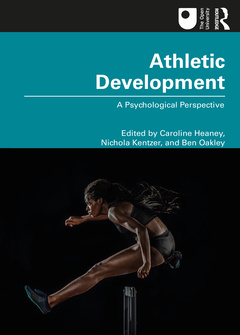Description
Athletic Development
A Psychological Perspective
Coordinators: Heaney Caroline, Kentzer Nichola, Oakley Ben
Language: English
Subjects for Athletic Development:
Keywords
Athletic Development; Coach Athlete Relationship; Athlete’s Journey; Sport Psychology; Mental Toughness; Athlete Welfare; Motivational Climate; PYD; IOC; Long Term Athletic Development; DMSP; Quality Coach Athlete Relationship; Youth Athletic Development; UK Sport; Mental Health; Vice Versa; PL; Goal Orientation Profile; Target; Talent Development; Development Journey; Athletic Retirement; Coach Athlete Communication; Mental Health Difficulties; TDEs
Publication date: 07-2021
· 17.4x24.6 cm · Paperback
Publication date: 07-2021
· 17.4x24.6 cm · Hardback
Description
/li>Contents
/li>Readership
/li>Biography
/li>
Athletic Development: A Psychological Perspective is an examination of the psychological factors that help or hinder the development of participants in sport. This includes influences such as families, coach-athlete interactions, and transitional episodes on an individual?s pathway in sport.
This edited collection of topical chapters shines a unique psychological perspective on the athlete?s development through sport. It explores a range of contemporary themes that influence athlete?s development including:
- An introduction to athletic development which orientates a holistic, psychological perspective of the athletic development process.
- Social influences on athletic development, which explores the impact of varied social influences (e.g., coach, family, peers, school) on sports participation and performance from a psychological perspective.
- Athlete wellbeing, which explores various aspects influencing mental health and welfare as an athlete progresses through their sports career.
The book combines key theory with illustrative case studies, to analyse the complexities of athletic development. It takes a critical perspective highlighting some of the debates and controversies in these areas and uses spotlight boxes in each chapter to focus on questions or topics of particular interest. Athletic Development: A Psychological Perspective is a key reader for all students in the fields of sport and exercise psychology, sport coaching, and related sport science subjects.
Introduction
Section I: Athletic Development: A Holistic View of the Journey
1. What Is Athletic Development?
2. How Did We Get Here? Exploring the Evolution of Athletic Development Perspectives
3. Transitions on the Athlete Journey: A Holistic Perspective
4. Retirement from Sport: The Final Transition
5. Researching Athletic Development
Section II: Social Influences on the Athlete’s Journey
6. Coach-Athlete Relationships: The Role of Ability, Intentions and Integrity
7. Towards Mutual Understanding: Communication and Conflict in Coaching
8. Creating an Optimal Motivational Climate for Effective Coaching
9. The Family Behind the Athlete
10. How Does the School Setting Influence Athletic Development?
Section III: Mental Health and Wellbeing on the Athlete’s Journey
11. Understanding Mental Health and Wellbeing in Sport
12. Developing Resilience on the Athlete’s Journey
13. Thriving in Athletic Development Environments
14. Athlete Welfare for Optimal Athletic Development
Section IV: Conclusions
15. Effective Athletic Development: Closing Thoughts




